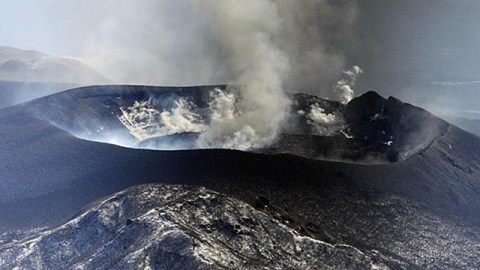New explosions at Kirishima shatter windows 8 km away – and its all caught on webcams!

The calendar has turned to February, campus is closed because we’re encased in ice and we’re all still watching Kirishima. Yesterday, the volcano produced another impressive explosion (video), one that broke windows as far as 8 km from the volcano. All of this new explosive activity (video) has prompted Japanese officials to extend the exclusion zone around the volcano to 4 km (out from 2 km) as these new explosions have hurled ash, tephra and bombs upwards of 2 km from the crater. The danger for pyroclastic flows is still though to be within 3 km of the crater. There has been significant ash fall on some of the towns (Japanese) surrounding the volcano, as much as 10 cm in some places. However, volcano alert status (Japanese) continues to be level 3. Not surprisingly, the explosion destroyed part of the new dome growing in the Shinmoe-dake Crater and it could even be pressure building under the dome that lead to the large explosion (but that is speculation).
The latest press release (Japanese) from the National Institute of Advanced Industrial Science and Technology says that this eruption of Kirishima is already 9 times larger than the 1959 eruption of the volcano, with over 70 million tonnes of ash and tephra erupted. You can begin to get an idea of the ash fallout as well, with a very heavily hit zone to the southeast of the volcano, as much as 10 kg/m2 upwards of 20 km from the Shinmoe-dake crater (see map below). You can also check out some images of bombs from the explosion in the latest update (Japanese) from the Japanese Meteorological Agency. UPDATE: Here is an NASA Earth Observatory image of the eruption as well, showing the plume towering over the surrounding clouds.

Ash fallout distribution, released by the National Institute of Advanced Industrial Science and Technology.
Eruptions webcam watchers did an excellent job as capturing the explosion as it happened – from multiple webcams no less – see the images below for before/after shots of the explosion.
Three images captured by Eruptions reader Raving on February 1, 2011

Kirishima at 7:52 local time with minor dust in the air.

Kirishima two minutes later, at 7:54 local time. Note the large ash cloud both expanding upwards and outwards from the Shinmoe-dake crater.

Kirishima two minutes after the explosion as the ash begins to disperse.
Two images captured by me on February 1, 2011

Kirishima at 7:56 local time after producing a large explosion. This might be the most textbook mushroom-shaped volcanic plume I’ve seen.

Kirishima and the Shinmoe-dake cone from the same vantage point less than an hour later.
Throughout the day, other explosions have been caught on webcam by Eruptions readers – one at 15:36 local time by Matt B., another at 23:20 on February 1 by Raving and Pgen Pgen (see below). Heck you can watch most of the days activity in great time lapse videos of the activity by Matt B.

Webcam capture of an explosive eruption at Kirishima, taken at 23:20 on February 1, 2011 by Eruptions reader Raving.
So, keep watching the webcams pointing at Kirishima (6th and 7th from bottom on right menu) – you know know what you’re going to end up spotting.
Top left: The dome growing within the Shinmoe-dake Crater at Kirishima as seen on February 1, 2011. Click on image to see larger version.




